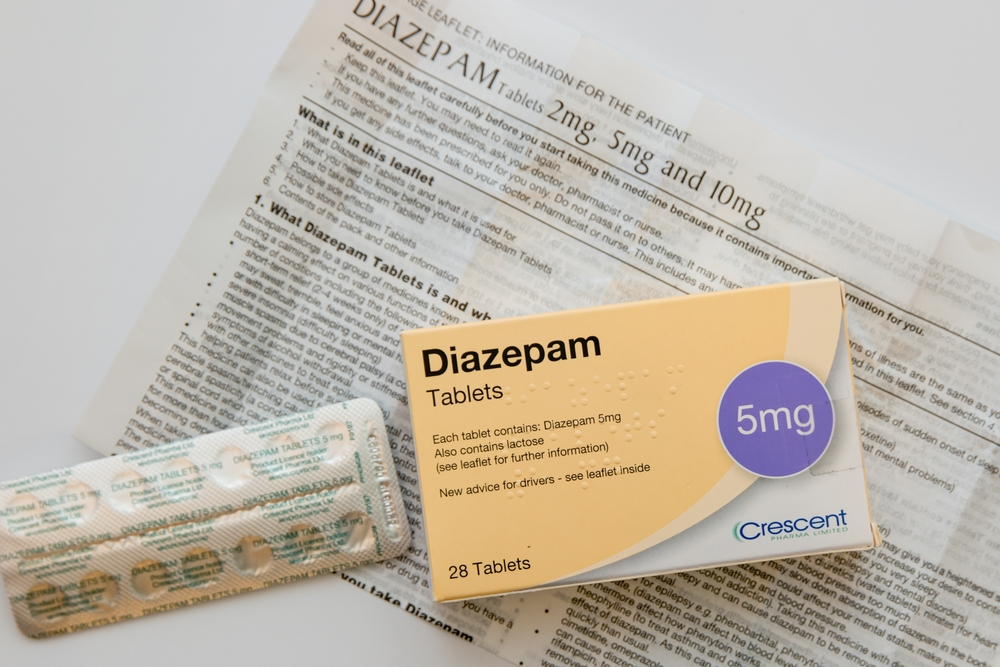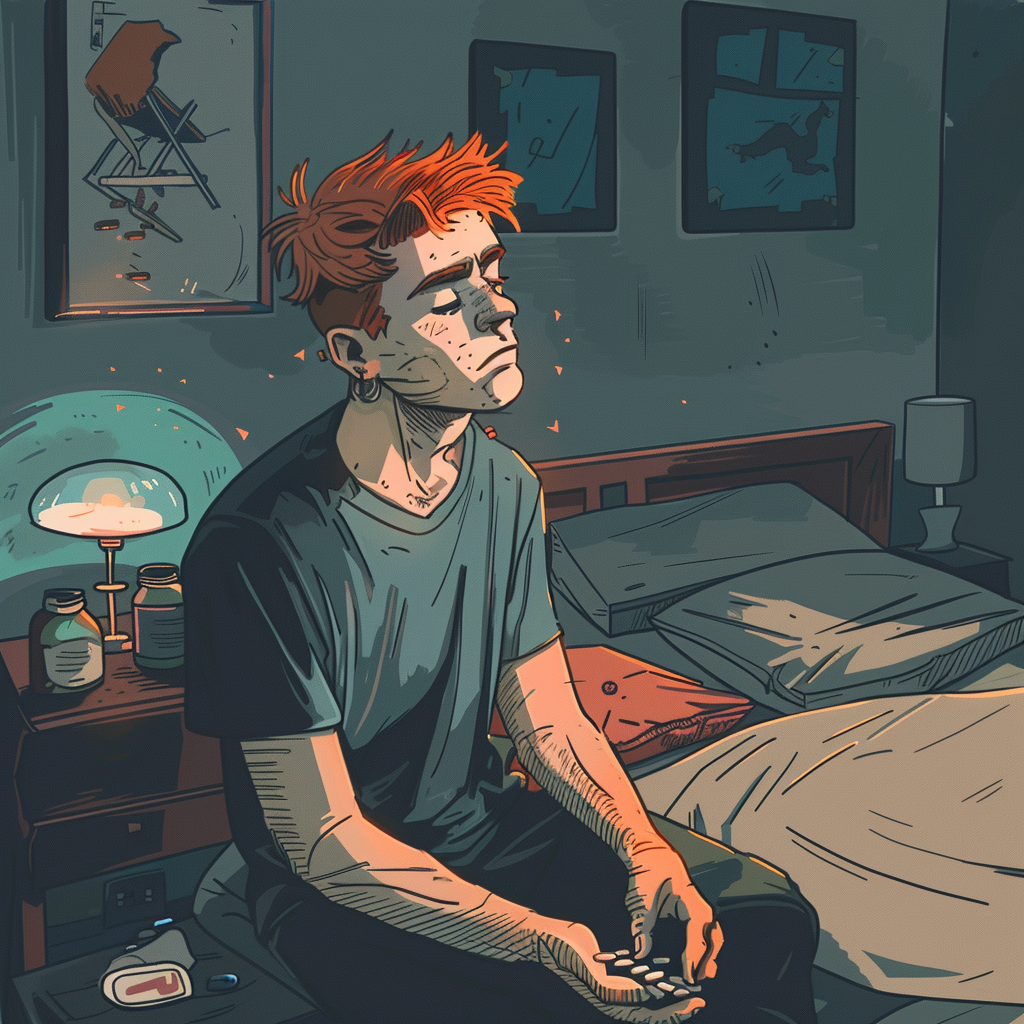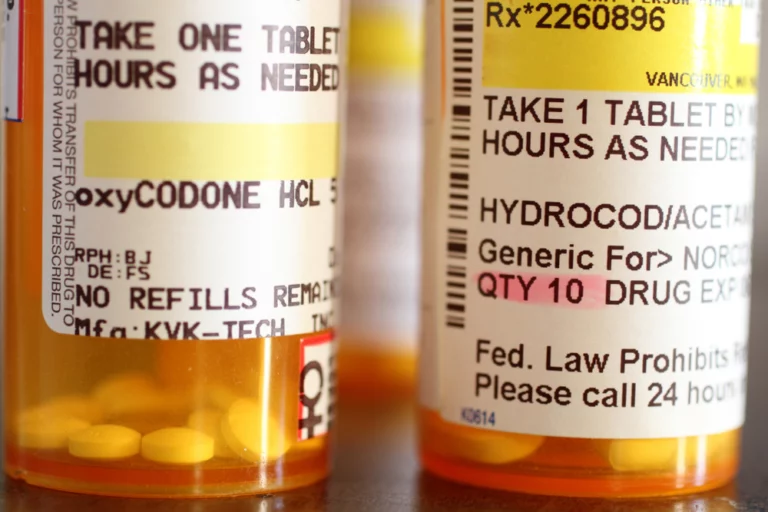Valium is not a narcotic or opioid. It’s classified as a Schedule IV benzodiazepine. You may also hear Valium referred to as a tranquilizer or “benzo” in popular culture. When prescribed properly, Valium is a legal substance. While Valium is not a narcotic, it still poses risks for substance abuse and addiction. Keep reading to learn more about Valium.

What Is Valium?
Valium is the brand name for the FDA-approved benzodiazepine, diazepam. It’s mostly used to treat and manage seizures and anxiety disorders and provide short-term relief of anxiety symptoms. In some cases, it’s prescribed to treat spasticity associated with upper motor neuron disorders. Valium is a psychoactive drug that works by calming the nervous system. Psychoactive drugs are substances that affect mental processes, perception, consciousness, cognition, mood, and emotions.
Valium was first introduced in the 1960s as a gentler, safer alternative to the barbiturates that were commonly prescribed at the time. One of the reasons why Valium is mistaken as an opioid or narcotic so frequently is because it induces relaxation, calmness, and mild euphoria and affects the brain and the nervous system.
Some people can struggle to recognize they’re abusing Valium due to its longer-lasting effects than other benzos. It can be easy to ignore or convince yourself you don’t have an addiction if you only take one pill a day and compare yourself to someone taking multiple, short-acting benzos a day.
When a person takes Valium, the positive feelings created are remembered by the brain’s reward system. This can induce cravings for the same effects again and again as part of a cycle of physical and mental dependency. Once dependency has formed, stopping becomes difficult, and Valiums’ ability to alter the brain chemically can lead to withdrawal symptoms.
Learn more about two other frequently abused bezos, Halcion and Xanax.

Signs Of Valium Dependency
Generally, Valium is only prescribed by medical professionals for short-term use due to its high risk for dependency. For example, it may be prescribed to help a person get through extreme anxiety ahead of a complicated medical procedure. While there’s no one-size-fits-all formula for how it occurs, it’s possible for dependency to develop in less than a few weeks. Common signs of Valium dependency include:
- Cravings.
- Anxiety about how much Valium you have access to.
- Inability to cut back or stop Valium use.
- Prioritizing obtaining or taking Valium above everything else.
- Attempting to obtain Valium by lying about medical conditions, seeing multiple doctors at once, or purchasing it illegally.
- Experiencing cognitive changes tied to Valium use.
- Feeling compelled to continue taking Valium even though it’s causing problems with your life, relationships, health, or well-being.
- Avoiding friends and family because you are concerned they will notice changes in you.
- Stealing to obtain Valium.
- Experiencing problems at work or school because of Valium use.
- Experiencing withdrawal symptoms when you either stop or reduce Valium consumption.
Many people who misuse Valium experience negative physical and cognitive side effects. Even people who are using diazepam according to their prescriptions may still experience unpleasant side effects. The most common side effects of Valium are sleepiness, drowsiness, confusion, issues with coordination, shaky hands, and tremors. Some other possible side effects include headache, dry mouth, slurred speech, paranoia, balance issues, muscle weakness, respiratory issues, and seizures.
Why Do People Get Addicted to Valium?
Like all benzodiazepines, Valium stimulates an inhibitory neurotransmitter in the central nervous system called gamma-aminobutyric acid (GABA). Valium’s overall calming effect on the body can create appealing side effects for people who are struggling with anxiety. However, the initial relief provided by Valium can cause users to become dependent on the drug even when they’re not anxious. Eventually, users can feel more anxious when they haven’t taken Valium and experience drastic mood changes when its effects wear off.
How Common Is Valium Dependency and Misuse?
While there isn’t a ton of data out there specifically about Valium addiction, there has been some research done on risks associated with the benzodiazepine class of drugs as a whole. One study finds that 2% of the population is estimated to have misused a benzodiazepine in the past year. Researchers have also been able to note recent increases in benzodiazepine misuse following the COVID-19 pandemic.
One of the reasons why Valium and benzo misuse is so problematic is that these substances are often paired with other substances. For example, an intensive review of benzodiazepine use, misuse, and abuse published within the past decade found that benzodiazepine abuse often results in poor outcomes because people often combine this class of drugs with other central nervous system depressants, such as opioids, cannabis, and alcohol. This is known as polysubstance abuse, and in 2019, almost half of all drug overdose deaths in the US involved multiple drugs.
Learn more about how long it takes to rewire the brain from benzodiazepine addiction.
Who Is at Risk for Valium Dependency?
Anyone can be at risk for valium dependency. Medical experts advise that patients should only take lower doses for two to four weeks when treating anxiety since the risk of addiction increases the longer a person continues taking Valium. Additionally, anyone with a history of substance abuse disorder (SUD) is at elevated risk for becoming dependent on Valium and other benzodiazepines.
Researchers have also discovered that individuals receiving opioid replacement therapy with methadone or buprenorphine may be at higher risk for benzo misuse and abuse. It’s believed that the vulnerability comes from higher levels of psychological distress experienced by this group. Another interesting risk factor among this group is a belief that benzos are not dangerous.
Take Our Addiction Quiz for Recovery Insights
What Is Benzodiazepine Withdrawal Like?
Withdrawing from Valium can be unpleasant for someone who is dependent. Withdrawal from any benzodiazepine should be considered a serious medical event that comes with risks and complications. Here’s a look at the common side effects that might be felt when withdrawing from Valium or other benzos.
Physical side effects:
- Headache
- Palpitations
- Sweating
- Tremors
- Muscle pain, stiffness, and aches in the limbs, back, neck, and jaw
- Dizziness or lightheadedness
- Shooting pains in the neck and spine
- Blurred vision
- Tinnitus (ringing ears)
- Grand mal seizures
- Nausea
Mental side effects:
- Confusion, disorientation, or delirium
- Delusions and paranoia
- Visual and auditory hallucinations
- Loss of appetite
- Insomnia or nightmares
- Anxiety and panic attacks
- Irritability, restlessness, or agitation
- Poor memory
- Sensory hypersensitivity to light, sound, touch, taste, and textures
- Metallic taste in the mouth
- Feelings of unreality, depersonalization, and derealization
- Depression

How Long Is Valium Withdrawal?
Valium withdrawal timelines can be somewhat unpredictable. The duration and severity of a person’s Valium abuse can greatly impact the withdrawal experience. Generally, a person who takes larger amounts of Valium over a longer period will experience more severe symptoms. However, the onset of valium withdrawal symptoms may be slower compared to symptoms tied to short-acting benzos.
As a longer-acting benzo, Valium generally produces withdrawal symptoms that appear later. It’s not unheard of for a person withdrawing from Valium to experience a first withdrawal symptom five days after ceasing use instead of during the one-day to two-day window that is common with shorter-acting benzos. Once symptoms start, they can last for several weeks.
Are You Covered For Valium Addiction Treatment?
Knoxville Recovery Center partners with numerous private insurance providers. Our team is committed to assisting you in quickly and effortlessly verifying your insurance coverage for treatment.
Does Valium Withdrawal Require Medical Detox?
Benzodiazepine medical detox is important for several reasons.
- When a person attempts to handle withdrawal alone at home without supervision, they are at risk of experiencing extreme discomfort and relapse.
- There is also a risk that withdrawal could veer into a more serious territory that involves seizure, heart attack, and other life-threatening occurrences.
- If a person begins taking Valium under a prescription for an anxiety disorder, there is a risk that “rebound anxiety” will occur during the withdrawal period.
Withdrawing in a structured and monitored environment offers a safe way to end Valium dependency. It can also help to reduce the chances of relapsing out of discomfort before a potentially multi-week withdrawal experience is over.
Valium Addiction Treatment at Knoxville Recovery Center
If you or a loved one is abusing Valium and want to leave a life of addiction behind, contact Knoxville Recovery Center. Our top-rated addiction treatment center in Knoxville, TN, has everything you need to overcome benzodiazepine addiction and dependency. Our on-site medical detox team can help you safely withdraw from Valium, and our residential treatment program can help you overcome the strong feelings and emotions you’ll feel in the early stages of recovery. Call, email, or fill out a callback form, and one of our admissions agents can help you get started.








